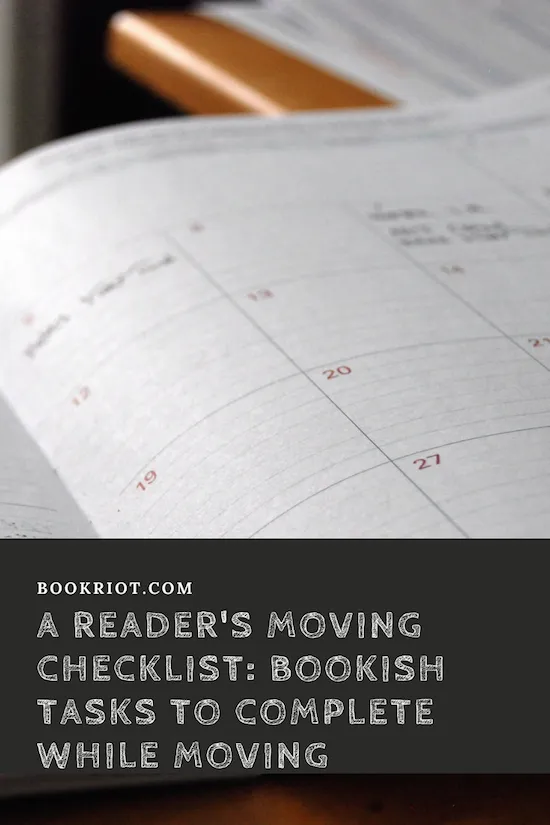
A Reader’s Moving Checklist: Bookish Tasks To Accomplish While Moving
Moving is a series of tasks and a series of lists of tasks to accomplish. For readers, this list of tasks includes so much about books—how to move them, where to move them, how to store/shelve/arrange them. To make the process a little easier, here’s a reader’s moving checklist of tasks to accomplish. This won’t be complete, but it’ll be a great guide for moving when you have books to consider.


Preparing To Move
- Purge your collection. For real. Go through your books, one by one, and make a decision about each one. Create three piles: one for books you’ll keep, one for books you’ll donate, and one for books you want to spend a little more time thinking about. The first pile you’ll move. The second pile, you’ll find good homes for. The third pile, you’ll reevaluate with the following questions: how long has it been sitting on my shelf? Will I actually read this book in the next year or two? Can I get this book at the library or borrow from a friend? When you ask those things, you’ll be able to sort each of those titles into either pile one or pile two.
- Organize. It might feel counterintuitive to organize your shelves when you’re preparing to pack and move them, but when you organize them before you get to the packing stage, you’re going to be able to pack, unpack, and re-shelve with better efficiency. You have more energy when you’re preparing to move than you do after you move. Use it while you’re not battling the urge to just shove everything in your new closets and “get to it later.”
Packing
- Stock Up on Reusable Bags With Flat Bottoms. Boxes are fine and all, but they’re not easy to carry or maneuver. Flat bottomed reusable bags—the kind you can pick up for $1 or so at grocery stores, Target, TJ Maxx, and other such places you’re already spending time at—can fit a whole lot of books in them, neatly, and they transport easily. They fit nicely into transportation. They store nicely. And they’re a million times easier to carry around than boxes. Bonus: when you’ve successfully unpacked those bags, you have a wealth of reusable shopping bags for many, many years.
- Load Bags As You Wish To Unload Them. Want to make sure that your favorite books get shelved first in your new place? Make sure you load them so they’ll be the first things you take out of the car or moving truck. You can label your reusable bags with masking tape to make it easier. Nothing is more annoying than playing “where the heck did that book get to?” when unpacking.
Moving Day
- Have A Plan. Will you be unloading all of your books into one room immediately? Will you be storing some or all of your collection elsewhere while you decide where and how you’ll be arranging them a you settle in? Come up with a plan when you arrive at the new place, and unpack with that in mind. This will make it easier than putting books wherever you can fit them and “figuring it out as you go.”
- Keep a Small Stack Of Books In Your “Unpack Immediately” Stuff. After a day or two or many of packing and moving, you’ll want to read something. Rather than have to dig out those books, have them as handy as you’d have your toothbrush and clean underwear. Give yourself a few options, so that you can choose the title based on your level of being able to engage with it.
- Be Patient With Yourself If You Don’t Want To Read. If the thought of reading or looking at books after all of the work of packing and moving them turns your stomach, then don’t do it. Let it go. Indulge in whatever it is you need to take care of yourself in that moment. It’s okay. The books will be there when you’re ready.
Settling Into A New Place
- Unpack According To Your Needs. If you know where you’re setting up your books, set aside chunks of time to shelve them. Listen to an audiobook to pass the time and still be taking in some reading. If setting aside a chunk of time to do this work isn’t possible, set up small tasks to get the work done. For example: you’ll unload one bag per day for three weeks until it’s all done. It might take a little time, but since you’ve already organized your books and you stored them in a manner that will make it easy to re-shelve them, this task will fit into whatever time you have available.
- Be Flexible. Maybe all of your bookshelves won’t fit into the room you hoped that they would. Maybe you find you don’t have the same kind of reading sanctuary you had in your old place. Be flexible with that and use it as an opportunity to get creative. Cookbooks can live on top of the refrigerator. If you have a decent-sized bathroom, set up some shelves in there for the books that you’d read in the tub or that you don’t mind being less-than pristine (at my house, you’ll find a huge collection of Uncle John’s Bathroom Readers and gifty humor books set up on a three-tiered shelf in the bathroom). Keep fitness books near where you work out. Home repair books can go neatly in a garage, shed, closet, or basement.
- Create A Reading Space. Maybe it’s the bathroom. Maybe it’s a tiny corner in a walk-in closet. Maybe it’s a spare room or a space on the porch or the deck. Find a small place where you can fit yourself comfortably and declare it your reading space. You don’t need fancy furniture—though you can always add it if you want. You can always drag a blanket into that space when you go to it to read. But by declaring a space as your reading space, it becomes a little bit more magical. It becomes your world away from the world.
- Follow Up On That List of Notes. Finish buying that series you’re missing a volume from. Return your borrowed books. Go through the tasks you wrote down before you moved and complete them.
- Get A Library Card. As soon as you’ve got mail with your new address, get yourself to your new library and grab a card.
Other Tips and Tricks
- Take Part in a Bookstagram or Other Challenge While You’re Still Unpacking. It doesn’t seem entirely logical to want to show off your collection while it’s still in various states of unpack, but that’s the point. By taking part in something like an Instagram challenge, you’ll force yourself to unpack a little bit each day (or choose to use a day to just get it all done in one go). It’s motivating.
- Lean Into Not Reading. Moving is one of the hardest things that we do. It can be a joyous event or a traumatic one. It doesn’t matter—moving is hard. If you find yourself disinterested in reading in any format, it’s okay. Let yourself not read. The books will be there for you when you’re ready.
- Research the Bookish History Of Your New Town. You might discover you live in the town a famous writer once called home or that your new town was once a hub of the typewriter industry. Discovering these things might not help make the physical part of moving easier, but it can make the psychological part more fulfilling.
- Find The Book Spots. Find your nearest local indie. The nearest local used bookshop. The nearest Little Free Libraries. The coziest coffee shops for grabbing a cuppa while diving into a great read. This is where you’ll find your home—and where you’ll be finding so many of the new people in your life.













